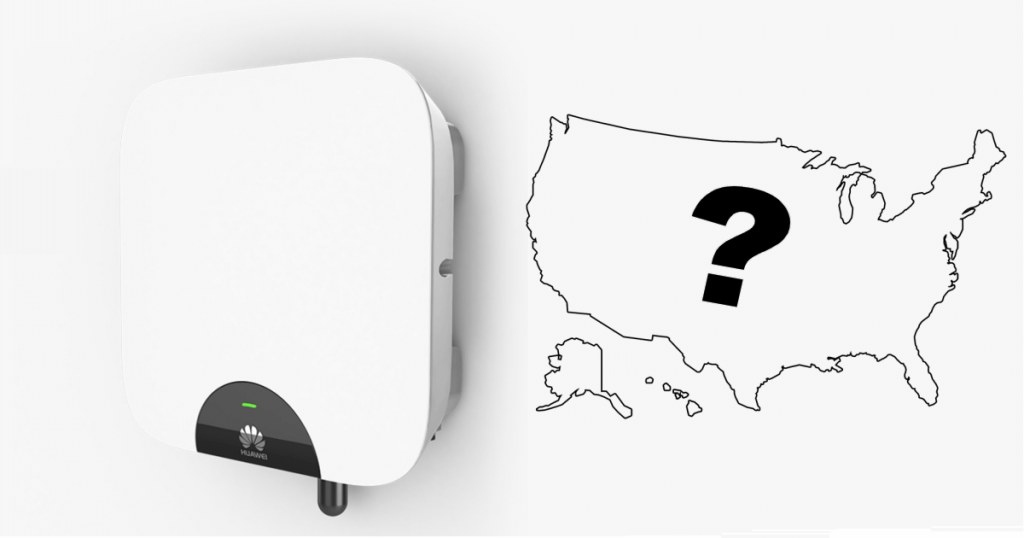
The world’s largest manufacturer of solar inverters, Huawei, won’t get a look-in with the U.S. market if a group of senators have their way.
Huawei really hasn’t had a lot of love from the U.S. Government, or Australia’s for that matter in relation to another major activity, telecommunications.
In the USA, the company has been blocked from the nation’s telecommunications market over allegations of it spying for the Chinese government.
The Australian government prohibited Huawei from tendering for NBN contracts in 2012 and it’s also been excluded from rollout of 5G here over security concerns. However, its inverters are available in Australia – you can check out an SQ Huawei solar inverter review here.
Huawei also has its eye on the U.S. residential and commercial solar inverter market.
Eleven senators, including Mitt Romney and Marco Rubio, have put their names to a letter addressed to U.S. Department of Energy Secretary Rick Perry and Department of Homeland Security Secretary Kirstjen Nielsen after becoming aware of the company’s plans, urging a ban based on perceived security threats.
I briefly mentioned the letter to SQ’s chief writer and cyber-security expert Ronald, who helpfully contributed his take on the situation:
“Yes. Huawei are spying on vital solar secrets. They could soon know more about levels of sunshine in parts of the US than the government does.”
Anyway, the reason the senators want to prevent Huawei solar inverters from entering the U.S. market is their fear of cyberattacks on the nation’s electrical systems and infrastructure via the devices.
“Both large-scale photovoltaic systems and those used by homeowners, school districts, and businesses are equally vulnerable to cyberattacks,” states part of the letter. “Our federal government should consider a ban on the use of Huawei inverters in the United States and work with state and local regulators to raise awareness and mitigate potential threats.”
This fear isn’t something the senators have made up on their own. Ridge Global LLC, which was founded by former Homeland Security Secretary Tom Ridge, published a report last year stating:
“..a hacker could access thousands of web-connected inverters and significantly alter the flow of power from them to the grid. In a worst-case scenario, a hacker could cause large, sudden spikes or dips in electricity supply, disrupting a local, state or national grid’s balance and potentially causing a widespread power outage”.
.. and there have been similar claims made previously.
I don’t have the tech smarts to say whether this is possible or not; particularly at a state/national level. But I’m assuming the hacker doesn’t necessarily have to be Chinese, nor the inverters be from Huawei to pull it off if it is (although both get a special mention in the Ridge Global report). There are a lot of web-connected inverters from various brands out there.
At the time of publishing, Huawei was yet to respond. It will be interesting to see if they take a similar step as they did to try and defend their 5G aspirations in Australia and post an open letter to these worried U.S. Senators. Not that their letter to Australian MPs, titled “Huawei Is Good And Safe For Australia“, did the company any good here.
However, speaking at MWC (Mobile World Congress) 2019 this week, Huawei Chairman Guo Ping stated he was all for “fact based regulation” and also said:
“Huawei has not and will never plant backdoors. And we will never allow anyone else to do so in our equipment.”
President Donald Trump said yesterday the US and China are “very very close” to signing a trade agreement – this Huawei situation could prove to be one of a number of potential spanners in the works.

 RSS - Posts
RSS - Posts



Not to put a fine point on it, but, yes.
The Huawei inverters have been accused of copyright infringement by Solaredge, and the solaredge product is fully programmable via the web interface.
Within reason, it wouldn’t be difficult to simultaneously “export limit” hundreds of thousands of Solar Systems based on the huawei inverter, to artificially create a shortage, driving the price up, increasing reliance on chinese majority owned generators, whether they be fossil, storage, or renewable.
It could be done randomly, overnight when no-one would notice, then restored the next night and so on and so forth.
It wouldn’t need to be a complete outage, although this is no doubt an option.
Chinese state owned/controlled companies (of which Huawei has been accused of being), could just limit export/production by a few % … maybe export limit by 0.2kW … very little difference to one person, but over hundreds of thousands, that’s a lot of instantaneous power missing from the grid at midday.
Effectively, China could “legally” milk Australia for money by coordinating chinese companies.
…. Have a solution, make a problem ….
A bit simplistic since this this issue as suggested affects all all web connected inverters and no mention of web connected batteries which has strongly been suggested that they are put under control of the network provider to manage load so there is no need to hack multiple machines just the provider /s that control 10,000’s of premises
Obviously Huwaei has already infiltrated my mobile phone and changed the date on the calender so I wouldn’t notice that today is actually April the First!